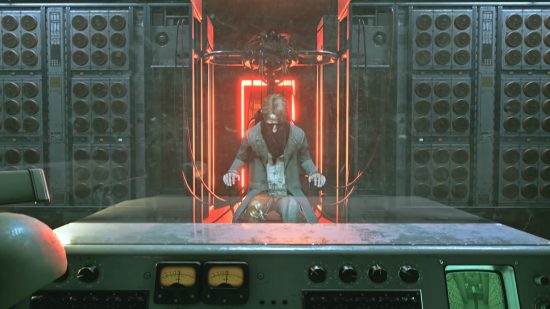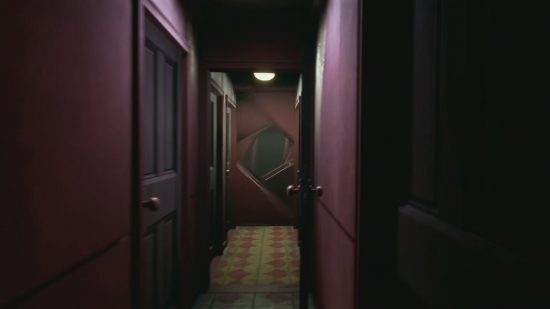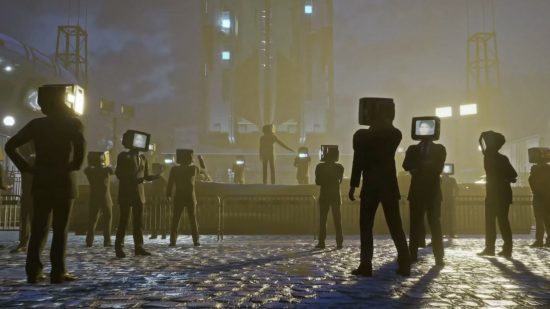Wired Direct 2024 delivered a veritable feast of upcoming indie games, though one has turned the heads of horror fans here at PCGamesN. In its debut outing, indie developer Pollard Studio delivers end-stage capitalist horror in Karma: The Dark World. Ahead of the showcase, we caught up with Pollard Studio and Wired Productions at GDC to uncover how this surreal, brutalist world goes beyond a Soviet-era spookfest with cutting-edge technology and a strong vision.

Karma: The Dark World follows in the footsteps of other story-driven first-person horror games like Layers of Fear and Soma, with exploration, stealth, and light puzzle-solving tied to player progression. However, its world sets it apart. Instead of a tormented artist or brain-injured everyman, Karma follows Daniel, a KGB-esque officer who probes his suspects’ memories with a crude facsimile of a VR headset. “Daniel’s job is to dive into people’s minds to collect evidence for the government,” executive producer Lu Chen explains, and in this early preview sequence, regular salaryman Shawn is in the interrogation chair.
George Orwell’s 1984 is an obvious source of thematic inspiration, though David Lynch’s Twin Peaks and Ken Levine’s Bioshock also get a mention. Within the confines of Shawn’s mindscape, I explore the rabbit warren of a corporate office building, dashing down murky stairwells, creeping between rows of workstations, and squirming belly-down through a ventilation system illuminated by a string of Christmas lights. In my attempt to escape an initial encounter with the twisted creature that haunts Shawn’s mindscape, he suffers a broken leg – and so he spends the rest of my preview with a nasty limp that restricts my ability to run from danger.
However, aside from the seminal FPS game, literature, film, and historical research have played a far greater role in Karma’s development than videogames. “Typical horror games are like chemistry,” Chen explains. “People remember they feel scared, but psychological horror – you think about it; feel it; maybe even dream about it.” Karma is also a vehicle for Pollard Studio to examine the economic and political conditions of East Germany, a subject typically presented by Western game studios. As a Chinese team, Pollard Studio is an underrepresented voice in that discussion. “We want to join in that topic and share our thoughts,” Chen tells me. Karma is, in effect, that fresh perspective made manifest, and those very same horror elements are designed to leave a lasting impression to facilitate it as a conversation starter, rather than horror for horror’s sake. “We want to bring a world to the audience that they can begin to talk about with friends and the people around them,” Chen says.
That said, while the ‘80s office decor and Soviet brutalism position Karma’s “dark world” in a specific historical context, Pollard Studio’s depiction of labor exploitation is strikingly contemporary. In my preview build’s stand-out sequence, I find myself in a pokey little office made smaller by haphazard stacks of paper that stretch from the floor to the ceiling. An enormous desk sits pride of place in the center of the room, and upon it sits a medicine bottle, a smaller stack of papers, and a rubber stamp complete with ink pad. Upon my approach, Shawn automatically sits down, takes up the stamp and the first sheet of paper… and so my work shift begins.
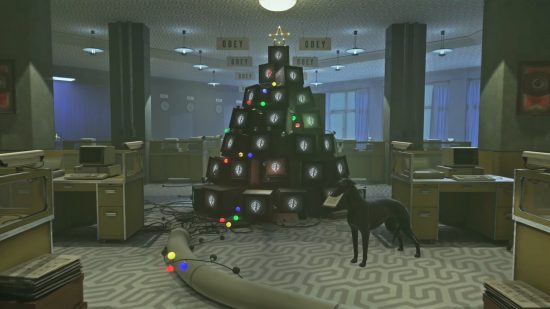
I move Shawn’s hand from ink pad to paper and back again with mechanical, assembly-line precision. Whenever I hesitate or my stamp runs out of ink, I’m punished with a jarring visual flicker and a sharp reprimand from a sharp-tongued manager. The TV on the opposite wall depicts an endless procession of company mandates that inexorably encroach on the freedom of its workers, and the ambient drone of the office environment around me takes on a tone of dread. At some point, I memorize how many sheets of paper I can stamp before I’m forced to load up on ink and optimize my work output accordingly. The TV commands me to drink from the medicine bottle. I refuse, I’m reprimanded, and that ambient drone rises to an unbearable pitch. I take a swig – and the dread subsides. I continue to stamp. Again. Again. The TV commands me to drink. I drink. I stamp. I drink. I stamp. I drink. The camera creeps towards the TV screen until they fold in on themselves, and my first-person perspective becomes a row of endless screens all depicting this dull procession of a regular day at the office.
All told, this highly tactile sequence serves as a powerful commentary on the monotony, isolation, and disconnect that can often arise from remote working, as well as the prevalence of crunch culture in game development. As alluring as white-collar corporate jobs in the tech industry might seem, there’s no escaping that an average workday amounts to long hours spent sitting in front of screens. Even Shawn’s fellow employees are represented in his mindscape with boxy CRT TVs in place of their heads, a low-resolution portrait of their true faces displayed in eerie, flickering purple. “A TV only plays what the viewer wants it to play,” Chen muses. “It doesn’t have any choice to choose the channel.” This, it seems to me, is the ultimate control – and the faceless authoritarians that dictate Shawn’s existence hold the remote.
Karma: The Dark World has been four years in the making and subject to several delays, with the latest to facilitate an upgrade to Unreal Engine 5. While many indie studios might wrestle with the benefits of this upgrade when weighed against the cost of a delay, the team expresses unanimous confidence in their decision. “We want to create a world – a universe – that the players have never seen,” Chen explains. This bid for realism is not just for vanity’s sake, but for as much immersion as Pollard Studio can eke out of the technology at its disposal.
No matter how grounded and mundane each office space may seem, reality inexorably melts into ‘dream’ logic as I engage with Karma’s environmental puzzles. This is no more apparent than during this preview’s main chase sequence. A long corridor full of propaganda posters and locked doors grows increasingly narrower until I reach what appears to be a dead end. As I turn to face the creature bearing down upon me, my perception shifts and a new corridor is revealed. “These aren’t dreams, but memories,” Wired Productions’ head of marketing Neil Broadhead reminds me. “What you see is a representation of different memories that Daniel’s got to break apart to discover what’s going on.” In this respect, the multi-limbed monster that stalks Shawn’s mindscape is not a million miles away from lauded artist Masahiro Ito’s Silent Hill enemy designs, which typically serve as stand-ins for a psychological anxiety that’s greater than themselves.
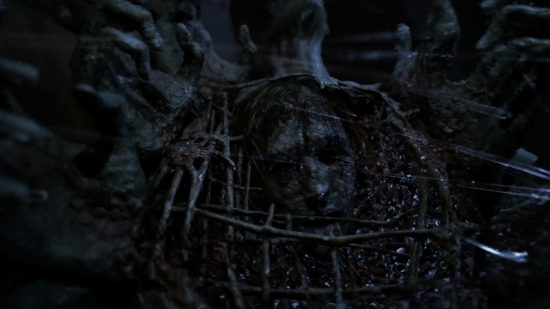
Of course, stunning visuals only get you so far, and Pollard Studio clearly understands the invaluable role of sound design. “We spent a lot of effort on audio recordings,” audio director Geng Li says. He recreates one of the stand-out effects in the demo – the visceral sound of a sighthound’s head shaking back and forth at an unnatural speed – by vigorously flapping his right hand. Sure, it’s a little funny out of context, but this commitment to real sounds over digital effects is another successful bid for immersion, and that unnatural manipulation of human flesh and bone is jarring to hear in-game. Karma: The Dark World also benefits from Dolby Atmos, a surround-sound audio format that has seen exceptional use in acclaimed horror games like Alan Wake 2 and Resident Evil: Village. “Dolby Atmos can bring a sense of distance,” Li explains. “You can pinpoint the exact positions [of sounds].”
The stifling claustrophobia of this demo preview is thematically on point, but I’m curious whether we can expect to find ourselves beyond the fluorescent lights and sterile walls of corporate life. “The levels do get grander in terms of buildings to explore,” Broadhead confirms, though he assures me that Karma will maintain its linearity from start to finish. “There is a narrative path that you’re on that will take you to the end.” While that ending is likely up to interpretation, “it’s not a game where you’re going to have choices that branch off to multiple endings. There’s a specific story to be told.”
This linearity leads me to wonder how long we can expect Karma: The Dark World to last. Story-driven indie games with this level of polish typically demand a shorter experience due to budget and time constraints, and while the team can’t share a playtime estimate at this point in development, I’m assured by Broadhead that “it certainly isn’t a three or four-hour game. It’s quite a substantial story.” This story will presumably take us into the mindscape of many other regular working citizens like Shawn, silently suffering within the stifled confines of a mass surveillance state.
However, Pollard Studio’s ambitions lie beyond the scope and vision for Karma: The Dark World. Broadhead tells me that the team also hopes to “push the boundaries of expectations around indie games,” to give players “the feeling that this could be published or developed by a triple-A studio with tens of millions.” It’s a lofty goal, but given that ‘quadruple-A’ Skull and Bones released with little to no fanfare only a few months ago, it’s clear that money doesn’t always talk. There’s an obvious appetite for indie games offering new and original experiences, and if Karma continues to diversify itself from the burgeoning canon of story-driven ‘walking simulator’ horror, the studio may reach those heights.
If you just can’t wait to descend into Karma: The Dark World, the best story games are sure to tide you over until we get word of a release date. We also have our favorite upcoming PC games to mark on your calendar, from indie horror to live-service launches.

